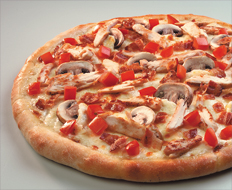Paul Wilke and his wife, Sue, have transformed their Toppers Pizza franchise unit in Mankato, Minnesota, into a must-have meal for Millennials. The couple has built and maintained a relationship with Minnesota State University (MSU), which has almost single-handedly driven their business since the store opened in 2007.
Having beat out larger brands like Papa John’s and Domino’s for the MSU partnership, the Wilkes’ Toppers unit thrives on campus activities, from involvement in athletic events to student-organized fundraisers.
Paul Wilke explains how franchisees can build this kind of relationship and use it to their benefit.
1. Combine Your Interests with Those of the School
In our particular case, we saw that there was a change in leadership at the Minnesota State University level, and that gave us the opportunity to eradicate any old relationships that had previously been instilled. Franchisees always need to be watching the surrounding community for these changes; it’s a great way to easily get your foot in the door.
After that, you need to share common interests with the university. If you’re just doing it for financial gain, the university will find that out and will most likely go somewhere else when the contract is up.
Toppers Pizza was not the lowest bidder during the initial stages of getting the deal with MSU, but it was our common goal to drive more students and community members to the university that gave us the edge. If you can find out what motivates the people you are hoping to partner with, they’ll grant you your wish if you can bring them theirs, too.
If you’re just starting a process like this, realize it might take a while. Typically, most students are there four years, which means most of your potential market in the beginning has loyalty to some other brand. Work toward matching the interest of students coming in and the others going out. Make sure the connections are there first and then look toward selling your product.
2. Be the Face of Your Business to the Students
Strive to create a comprehensive partnership. Because of this relationship, our store is up more than 25 percent this year and has only been open four years. We have accommodated to the market and have, in a sense, become a college-specific franchise.
The college world enables franchisees to establish an emotional connection, too, which is a relationship that doesn’t happen often in other locales.
We personally deliver most of the pizza for events and stay for as many games as we can. It’s your deal and, more importantly, it’s your money being spent. You need to make the connections and be sold into your own idea. One of the biggest mistakes franchisees make is letting their employees handle business practices after a deal has been made.
Working outside the four walls of a building goes a long way in this sort of market.
When my wife and I started planning for this process in 2005, we knew we wanted to make changes in the area. We felt that the community was being underserved and we wanted to change how the game was played, and a college has that opportunity. By specifying our demographic, we can better manage our dollars and business because we know to whom we are catering. Having the college demographic, typically ages 18–24, we’ve been able to make easier and smarter decisions on what to spend our money on.
You have to be tactical and strategic when marketing, but knowing your customer base is even more important. I’m not going to take out an ad in the local paper promoting Toppers Pizza when the customers I am trying to reach don’t read it. A lot of franchisees just throw money around to get their name out there; moreover, they don’t want to get up from behind the desk. The best part about partnering with a university is getting the opportunity to personally get out there and sell yourself and your business. College students and organizations recognize the loyalty, and your business will benefit because of it.
3. Go Where the Students Go
There are so many ways to sell your business within the college world. Toppers Pizza sponsors local tournaments at the college and hands out free pizza. We participate in high school basketball camps during the summer months. We even seek to employ college students, especially those participating in athletics, to show our support for the school. In short, wherever the students are, we want to be.
The collegiate world allows a franchisee to display a level of commitment, not just to the college, but also to the community. Loyalty is a big factor in today’s market and customers like to see what any sort of business has to offer it’s surrounding area. For example, a number of students participate in Campus Kitchens, a program that takes leftover food from university events and donates it to homeless shelters and needy people in the community. When coming into this deal, we jumped right on board with this program and helped the students raise money for such a great cause.
In this tight market, business practices like these get noticed and enable more opportunities to sell your product. One thing that we don’t do, and franchisees should never do, is donate our product or time without getting something in return. This doesn’t always have to be a financial benefit. If you’re going to provide your product, make sure people know you are.










